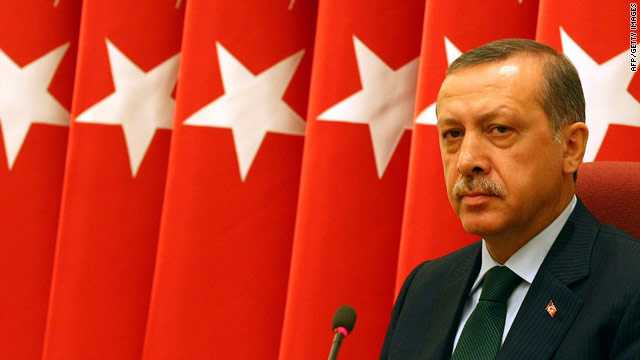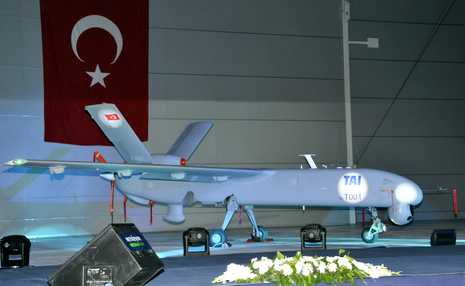
Editor’s note: Jonathan Schanzer, a former terrorism finance analyst at the U.S Department of the Treasury, is vice president for research at the Foundation for Defense of Democracies, where Emanuele Ottolenghi, author of ‘The Pasdaran: Inside Iran’s Islamic Revolutionary Guard Corps,’ is a senior fellow. The views expressed are their own.
In a surprise development on Friday, Israeli Prime Minister Benjamin Netanyahuissued an apology to Turkish Prime Minister Yayyip Erdoğan over the ill-fatedMay 2010 flotilla conflict on the high seas between Israeli commandos and Turkish-backed activists seeking to break the Israeli blockade of Gaza.
The clashes left nine Turks dead. Erdoğan has been demanding an apology ever since, while ramping up his anti-Israel rhetoric – most recently, comparing Zionism with fascism. With relations at their nadir, the Israelis had nothing to lose by issuing this apology – Netanyahu’s apology was clearly a concession to U.S. President Barack Obama, who just garnered a great deal of goodwill during his much-heralded trip to Israel.
But if Obama plays his cards right, he should make demands of Erdoğan, too. The relationship between the two men is already warm. According to the Los Angeles Times, “Obama has logged more phone calls to Erdogan than to any world leader except British Prime Minister David Cameron.” But the president has ignored the fact that Turkey has also become one of the more troubling epicenters of illicit financial activity.
After delivering the Israeli apology to Turkey, Obama has an opportunity to demand that Erdoğan cease this activity.
For one, Turkey is believed to have emerged in recent years as one of the primary patrons of the Palestinian terrorist group Hamas. In December 2011, Erdoğan reportedly “instructed the Ministry of Finance to allocate $300 million to be sent to Hamas’ government in Gaza.” Since then, Turkey has reportedly provided Hamas with funds for hospitals, mosques, and schools in the Gaza Strip, with other resources to help rebuild the territory, particularly after the Hamas war with Israel in November 2012.
Turkey is not Hamas’ only sponsor, of course. There is Qatar, which has been on a regional spending spree. And there is also Iran, which has had a difficult time meeting its sponsorship obligations, thanks to Western sanctions designed to derail its nuclear program.
Sanctions won’t work, however, if Turkey has its way.
Iran has apparently been benefiting handsomely from Turkey’s Halkbank. According to Turkey’s Deputy Prime Minister Ali Babacan, “In essence, gold exports [to Iran] end up like payments for our natural gas purchases.” In August 2012, according to Reuters, “nearly $2 billion worth of gold was sent to Dubai on behalf of Iranian buyers.” Halkbank acknowledged that it was responsible for processing the payments. Despite increased scrutiny, the Turkish newspaperZaman noted in January that the Iranian “gas-for-gold” was still going.
Halkbank, meanwhile, has reportedly helped Iran on other scores. In February 2012, the Wall Street Journal reported that Halkbank was processing “payments from third parties for Iranian goods.” This included “payments for Indian refiners unable to pay Tehran for imported oil through their own banking system for fear of retribution from Washington.”
In November 2012, a Turkish banking watchdog announced Halkbank had curbed its illicit dealings. But the bank’s website clearly boasts of arepresentative office in Tehran.
To be fair, Halkbank is almost certainly not the only Turkish institution to have dabbled in sanctions busting schemes. In November 2012, the Turkish newspaper Zaman noted that there are currently over 2,000 Iranian companies registered in Turkey. How many of these companies have ties to the Iranian government? How many of them throw off cash to the regime? More importantly, how many of them help Tehran procure dual-use materials that brings the Iranian nuclear bomb one step closer to reality?
As it turns out, at least one does. German police recently exposed a networkthat supplied Iran with nuclear industry components through Turkey. But the announcement came only after hundreds of components for Iran’s Arak heavy water nuclear reactor made their way to Iran undetected.
Turkey can, in this case, claim that it had no knowledge of this network. But that won’t fly when it comes to the Turkish branches of Bank Mellat, an Iranian bank sanctioned by the U.S. and the EU. Turkey continues to allow the bank to operate on its soil because the United Nations has yet to designate it. According toZaman, as recently as April 2012, other Iranian banks have also applied to operate in Turkey’s financial market.
Part of the problem is Turkey’s legal regime. For more than five years, the Financial Action Task Force (the U.N. of terrorism finance) warned that Ankara had neither adequately criminalized terrorism finance nor established sufficient infrastructure to identify and freeze terrorist assets. FATF first flagged the problem, via a mutual evaluation, in 2007. Ankara did nothing for five years, until FATF threatened to add Turkey to the black list, which currently only includes Iran and North Korea. Erdogan and the Turkish parliament eeked out legislation and averted the blacklisting just shy of the February 22 deadline.
The result of this five year blackout and cavalier attitude to sanctioned Iranian financial institutions: Turkey was not bound to any laws, despite international pressure to fight terrorism or illicit nuclear proliferation. With over 2,000 Iranian companies involved in anything from energy to commodities, real estate to finance to the automotive sector, the potential for mischief is enormous. Had Turkey put its house in order, it might have been able to prevent significant embarrassment.
Turkey watchers quietly concede that more embarrassment is likely on the horizon. From Hezbollah assets to money-changers and gold dealers who do Iran’s bidding to government backing of jihadists in Syria, Turkey will remain an illicit finance problem for the foreseeable future.
Thanks to his ability to deliver Israel’s apology, Obama has increased leverage to reverse this trend.




